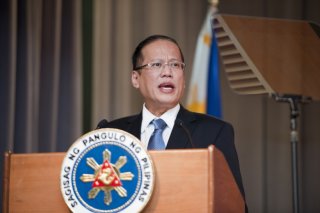Against China: Is the Philippines' 'Moralpolitik' the Right Move?
President Aquino's tough stance on China has managed to mobilize the Southeast Asian country against a tough neighbor. But at what cost?
It is true that a growing number of people have grown skeptical (46 percent) of the efficacy of Aquino’s strategy vis-à-vis China. But it would be a huge mistake to assume that this means the next administration can radically alter its China policy when there is no sign of genuine compromise on Beijing’s side. Unlike in the past, when there was a very low level of public awareness vis-à-vis the South China Sea disputes, the Filipino public as well as scores of media outlets, leading academics, former and current officials, and highly-motivated civil society groups have been following the South China Sea disputes minute-by-minute, ensuring that the government will not succumb to Chinese pressure and defend the country’s claims.
Moreover, the legacy of the Arroyo administration (2001-2010), which engaged in controversial joint-development agreement with China in the South China Sea that was followed by several corruption-ridden business deals, has left a very negative impression among the Filipino leadership and broader populace. No wonder, then, any suggestion of dialogue or engagement with China is received with utmost suspicion by most people in the Philippines.
Anti-China sentiments are at historic highs. As many as 93 percent of the Filipinos fear an outright war (with China) in the South China Sea, with a clear majority (58 percent) viewing China as a national security threat. This means being tough on China is simply good politics, and that is why most presidential candidates shun criticizing Aquino’s tough rhetoric and approach to China. A leading candidate who openly called for greater engagement with China came under tremendous criticism, and is now struggling with corruption-related allegations and is rapidly losing ground in the elections.
Overall, the Aquino administration’s “Moralpolitk”—injection of morality into foreign-policy discourse—has managed to mobilize the Southeast Asian country against a tough neighbor. But the moralistic approach may have come at the expense of more tangible means to defend the Philippines’ claims, as well as the establishment of much-needed communication channels with China in order to avoid accidental clashes in disputed areas, not to mention potentially-lucrative trade and investment ties.
Richard Javad Heydarian is an Assistant Professor in international affairs and political science at De La Salle University, and previously served as a policy advisor at the Philippine House of Representatives. As a specialist on Asian geopolitics and economic affairs, he has written for or interviewed byAl Jazeera, Asia Times, BBC, Bloomberg, Foreign Affairs, The New York Times, Wall Street Journal, The Huffington Post, The Diplomat, The Financial Times, and USA TODAY, among other leading international publications. He is the author of How Capitalism Failed the Arab World: The Economic Roots and Precarious Future of the Middle East Uprisings (Zed, London), and the forthcoming book Asia’s New Battlefield: US, China, and the Struggle for Western Pacific (Zed, 2015). You can follow him on Twitter: @Richeydarian.
Image: Flickr/World Bank

